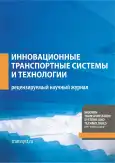Problems of carsharing integration in urban transport systems of Russian megacities
- Authors: Volkova E.M.1
-
Affiliations:
- Emperor Alexander I Petersburg State Transport University
- Issue: Vol 8, No 1 (2022)
- Pages: 124-132
- Section: Original studies
- URL: https://bakhtiniada.ru/transj/article/view/100527
- DOI: https://doi.org/10.17816/transsyst202281124-132
- ID: 100527
Cite item
Full Text
Abstract
Background: Transport problems of Russian megacities are mostly consequences of motorization increasing and inefficient transport policy provided by local transport authorities. At the same time, the structure of urban transport markets is changing because of new business models of transport sharing emerging and development. Different models of sharing could be an important part of urban transport systems, but it requires initiative both of transport companies and local transport authorities.
Aim: to assess the state and determine the prospects for the development of the Russian carsharing market as a whole, as well as its largest segment (the carsharing market in Moscow).
Methods: methods of statistical analysis, graphical representation of information, summary, methods of analysis of industry markets (concentration index, Herfindahl –Hirschman index).
Results: In this article barriers for the development of transport sharing in Russian cities are identified, and forms of sharing integration in urban transport cities are developed.
Conclusion: The results obtained can be used by local authorities responsible for public transport services and the development of transport policy in Russian cities, as well as transport organizations engaged in multimodal transportation of passengers in megacities.
Full Text
##article.viewOnOriginalSite##About the authors
Elena M. Volkova
Emperor Alexander I Petersburg State Transport University
Author for correspondence.
Email: moonlight34@ya.ru
ORCID iD: 0000-0003-0620-463X
SPIN-code: 6886-5796
https://www.pgups.ru/sveden/employees/volkova-elena-mikhaylovna
Candidate of Economic Sciences, associate professor
Russian Federation, 191131, St. Petersburg, Moskovsky pr., 9References
- Официальный сайт Федеральной службы государственной статистики. Доступно по: https://www.gks.ru. Ссылка активна на 02.02.2022. [Oficialnyj sajt Federalnoj sluzhby gosudarstvennoj statistiki. [Internet]. [cited 2022 February 02]. Available from: https://www. gks.ru (In Russ.)].
- Лапидус Б. М., Лапидус Л. В. Гладкая бесперебойная транспортная система - инновационная модель будущего: природа, сущность, детерминанты качества // Вестник Московского университета. Серия 6. Экономика. – 2017. – № 2. – С. 45–63. [Lapidus BM, Lapidus LV. Smooth Seamless Transport System – the Innovative Model of the Future: Nature, Essence, Quality Determinants. Vestnik Moskovskogo universiteta. Seriya 6. Ekonomika. 2017;2:45-63. (In Russ.)].
- Wruk D, Oberg A, Friedrich-Schieback M. Quantifying the Sharing Economy. GAIA. 2018;28:184-189. doi: 10.14512/gaia.28.S1.3
- Duan Q, Ye X, Li J, Wang K. Empirical Modeling Analysis of Potential Commute Demand for Carsharing in Shanghai, China. Sustainability (Switzerland). 2020;12(2). doi: 10.3390/su12020620
- Bellini F, Dulskaia I, Savastano M, D'Ascenzo F. Business Models Innovation for Sustainable Urban Mobility in Small and Medium-sized European Cities. Management and Marketing. 2019;14(3):266-277. doi: 10.2478/mmcks-2019-0019
- Gilibert M, Ribas I. Synergies between App-based Car-related Shared Mobility Services for the Development of more Profitable Business Models. Journal of Industrial Engineering and Management. 2019;12(3):405-420. doi: 10.3926/jiem.2930
- Farajallah M, Hammond RG, Pénard T. What Drives Pricing Behavior in peer-to-peer Markets? Evidence from the Carsharing Platform BlaBlaCar. Information Economics and Policy. 2019;48:15-31. doi: 10.1016/j.infoecopol.2019.01.002
- Laa B, Emberger G. Bike sharing: Regulatory Options for Conflicting Interests – Case Study Vienna. Transport Policy. 2020. doi: 10.1016/j.tranpol.2020.03.009
- Link С, Strasser С, Hinterreiter M. Free-floating Bikesharing in Vienna – a User Behaviour Analysis. Transportation Research Part A. 2020:168-182. doi: 10.1016/j.tra.2020.02.020
- Hahn R, Ostertag F, Lehr A, Büttgen M, Benoit S. “I Like It, but I don't Use It”: Impact of Carsharing Business Models on Usage Intentions in the Sharing Economy. Business Strategy and the Environment. 2020;29(3):1404-1418. doi: 10.1002/bse.2441
- Alonso-Gonzalez MJ, van Oort N, Cats O, Hoogendoorn-Lanser S, Hoogendoorn S. Value of Time and Reliability for Urban Pooled On-demand Services. Transportation Research Part C. 2020. https://doi.org/10.1016/j.trc.2020.102621
- Papu Carrone A, Hoening VM, Jensen AF, Mabi SE, Rich J. Understanding car Sharing Preferences and Mode Substitution Patterns: A Stated Preference Experiment. Transport Policy. 2020. doi: 10.1016/j.tranpol.2020.03.010
- Münzel K, Boon W, Frenken K, Vaskelainen T. Carsharing Business Models in Germany: Characteristics, Success and Future Prospects. Information Systems and E-Business Management. 2017. https://doi.org/10.1007/s10257-017-0355-x
- Rentcarus: портал про аренду автомобилей. Доступно по: https://www. rentcarus.ru. Ссылка активна на 02.02.2022. [Rentcarus: portal pro arendu avtomobilej. [Internet]. [cited 2022 February 02]. Available from: https://www. rentcarus.ru (In Russ.)].
- Малиновский М.П., Аракелян Т.К. Каршеринг: проблемы участников и сторонних лиц // Автомобиль. Дорога. Инфраструктура. – 2018. – № 3 (17). – С. 2. [Malinovskij MP, Arakelyan TK. Carsharing: Problems of Participants and Third Parties. Avtomobil'. Doroga. Infrastruktura. 2018;3(17):2. (In Russ.)].










